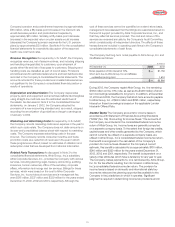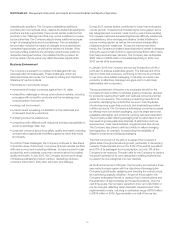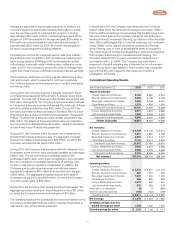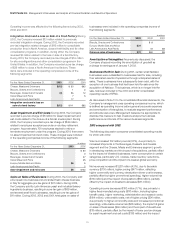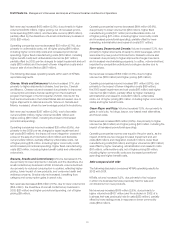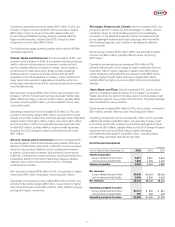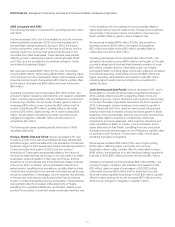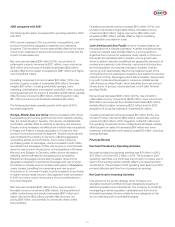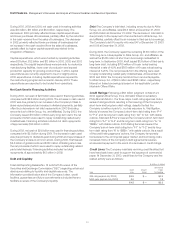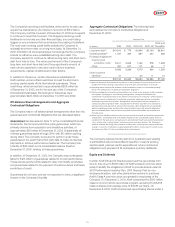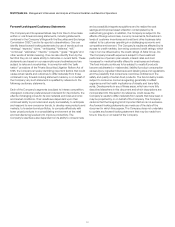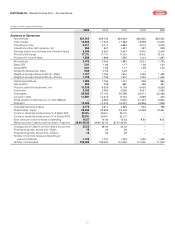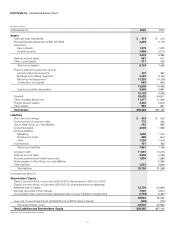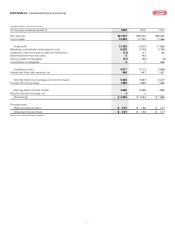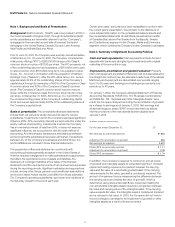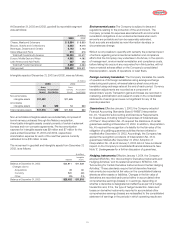Kraft 2003 Annual Report Download - page 37
Download and view the complete annual report
Please find page 37 of the 2003 Kraft annual report below. You can navigate through the pages in the report by either clicking on the pages listed below, or by using the keyword search tool below to find specific information within the annual report.
The Company’s revolving credit facilities, which are for its sole use,
require the maintenance of a minimum net worth of $18.2 billion.
The Company met this covenant at December 31, 2003 and expects
to continue to meet this covenant. The foregoing revolving credit
facilities do not include any other financial tests, any credit rating
triggers or any provisions that could require the posting of collateral.
The multi-year revolving credit facility enables the Company to
reclassify short-term debt on a long-term basis. At December 31,
2003, $1.9 billion of commercial paper borrowings that the Company
intends to refinance were reclassified as long-term debt. The
Company expects to continue to refinance long-term and short-term
debt from time to time. The nature and amount of the Company’s
long-term and short-term debt and the proportionate amount of
each can be expected to vary as a result of future business
requirements, market conditions and other factors.
In addition to the above, certain international subsidiaries of
Kraft maintain uncommitted credit lines to meet the short-term
working capital needs of the international businesses. These
credit lines, which amounted to approximately $658 million as
of December 31, 2003, are for the sole use of the Company’s
international businesses. Borrowings on these lines were
approximately $220 million at December 31, 2003 and 2002.
Off-Balance Sheet Arrangements and Aggregate
Contractual Obligations
The Company has no off-balance sheet arrangements other than the
guarantees and contractual obligations that are discussed below.
Guarantees: As discussed in Note 17 to the consolidated financial
statements, the Company had third-party guarantees, which are
primarily derived from acquisition and divestiture activities, of
approximately $38 million at December 31, 2003. Substantially all
of these guarantees expire through 2014, with $13 million expiring
during 2004. The Company is required to perform under these
guarantees in the event that a third party fails to make contractual
payments or achieve performance measures. The Company has
aliability of $26 million on its consolidated balance sheet at
December 31, 2003, relating to these guarantees.
In addition, at December 31, 2003, the Company was contingently
liable for $123 million of guarantees related to its own performance.
These include surety bonds related to dairy commodity purchases
and guarantees related to the payment of customs duties and taxes,
and letters of credit.
Guarantees do not have, and are not expected to have, a significant
impact on the Company’s liquidity.
Aggregate Contractual Obligations: The following table
summarizes the Company’s contractual obligations at
December 31, 2003:
Payments Due
2009 and
(in millions) Total 2004 2005–06 2007–08 Thereafter
Long-term debt(1) $10,510 $ 775 $1,994 $2,100 $5,641
Operating leases(2) 1,187 307 397 247 236
Purchase obligations(3):
Inventory and
production costs 5,611 2,643 1,162 578 1,228
Other 781 617 111 46 7
6,392 3,260 1,273 624 1,235
Other long-term
liabilities(4) 41 20 11 10
$18,130 $4,342 $3,684 $2,982 $7,122
(1) Amounts represent the expected cash payments of the Company’s long-term debt and do not
include short-term borrowings reclassified as long-term debt, bond premiums or discounts.
(2) Operating leases represent the minimum rental commitments under non-cancelable operating
leases. The Company has no significant capital lease obligations.
(3) Purchase obligations for inventory and production costs (such as raw materials, indirect materials
and supplies, packaging, co-manufacturing arrangements, storage and distribution) are
commitments for projected needs to be utilized in the normal course of business. Other purchase
obligations include commitments for marketing, advertising, capital expenditures, information
technology and professional services. Arrangements are considered purchase obligations if a
contract specified all significant terms, including fixed or minimum quantities to be purchased, a
pricing structure and approximate timing of the transaction. Most arrangements are cancelable
without a significant penalty, and with short notice (usually 30 days). Any amounts reflected on
the consolidated balance sheet as accounts payable and accrued liabilities are excluded from
the table above.
(4) Other long-term liabilities primarily consist of certain specific severance and incentive compensation
arrangements. The following long-term liabilities included on the consolidated balance sheet are
excluded from the table above: accrued pension, postretirement health care and postemployment
costs, income taxes, minority interest, insurance accruals and other accruals. The Company is
unable to estimate the timing of the payments for these items. Currently, the Company anticipates
making U.S. pension contributions of approximately $70 million in 2004, based on current tax law
(as discussed in Note 14 to the consolidated financial statements).
The Company believes that its cash from operations and existing
credit facilities will provide sufficient liquidity to meet its working
capital needs, planned capital expenditures, future contractual
obligations and payment of its anticipated quarterly dividends.
Equity and Dividends
In 2002, Kraft’s Board of Directors approved the repurchase from
time to time of up to $500 million of Kraft’s Class A common stock
solely to satisfy the obligations of Kraft to provide shares under its
2001 Performance Incentive Plan, 2001 Director Plan for non-
employee directors, and other plans where options to purchase
Kraft’s Class A common stock are granted to employees of the
Company. On December 3, 2003, Kraft completed the $500 million
Class A common stock repurchase program, acquiring 15,308,458
Class A shares at an average price of $32.66 per share. On
December 8, 2003, Kraft commenced repurchasing shares under a
35


